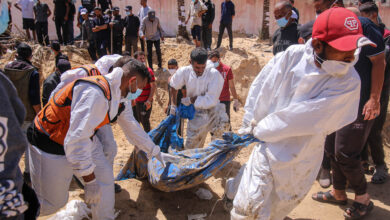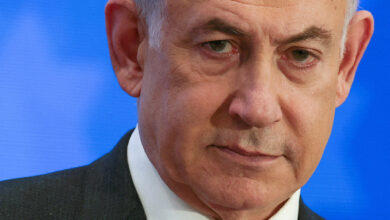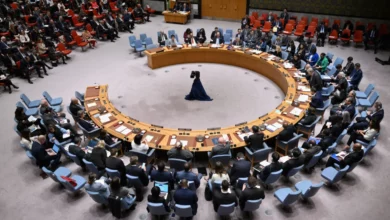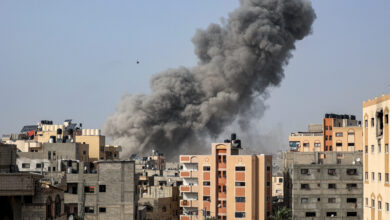Jerusalem–While controversial in Egypt and abroad, the ruling National Democratic Party (NDP)'s ''success'' in the recent parliamentary elections is being quietly applauded by many Israelis.
Former Israeli ambassador to Egypt, Eli Shaked, said Israel is satisfied with the poll because it dealt a blow to radical Islamist forces and, in his view, strengthened the position of the regime, seen by Israel as a linchpin of regional stability and a de facto partner against Hamas and Iran.
Several leading independent Israeli analysts of Egyptian politics, however, take a different view of the elections. They predict that the shut out of the opposition will increase domestic tensions and ''boomerang'' on the NDP in the run up to the presidential elections, scheduled for September 2011.
Hebrew University's Elie Podeh expects increased street violence as the date of the presidential election approaches, adding that its intensity will depend on the behaviour of security forces.
Shaked, who served as ambassador to Cairo from 2003 to 2005 and is now retired, said the results ''are positive from an Israeli point of view, for the West in general and for reasonable actors in the region because the Mubarak regime has proven to be moderate and stable and the alternative might bring dangerous instability.''
Final results showed the NDP won 474 out of 508 seats. The Muslim Brotherhood, which had gained a fifth of the assembly seats in the 2005 elections, secured only one seat in the 2010 elections. Brotherhood leaders have threatened to oust the lone victor from the movement if he claims office. Analysts expect him to bow out, leaving virtually no Brotherhood representation in the new chamber.
Shaked was unimpressed by rights groups' charges that fraud and manipulation determined the NDP sweep, saying that the elections were never expected to be clean.
''The results are not surprising,'' Shaked said. ''You would have to be very stupid to repeat twice the same mistake,'' he said in reference to the regime's permittance of the Brotherhood's relative success in 2005. ''The results have shown the regime has learned the lesson of the mistake of the previous election,'' he added.
Reflecting a widely held view among the Israeli policy making elite, Shaked suggested that free and fair elections are not appropriate in the Egyptian context and should not be demanded of Egypt.
''You cannot let anti-democratic, radical forces enjoy freedom in a crucial time of elections just in order to take advantage of this freedom to advance an antidemocratic, antiliberal agenda,'' he said. "I prefer this kind of non-democratic Egypt ruled by moderate, sensible people rather than an Egypt ruled by radical fundamentalists like the Muslim Brotherhood."
''The alternative to the regime in Egypt is a fundamentalist radical Muslim regime that will bring Egypt down. It is not to the benefit of Israel to have this kind of regime in Egypt. We should pray for Mubarak to live until he is 120 years old. The alternative can be horrible.”
''It's enough for us to know that Mubarak won the elections,'' Shaked added. ''How he did it and whether it was clean is of less importance.''
Shaked argues the method of NDP victory was irrelevant, while arguing the shut out of the opposition carries a signal to the international community in advance of the September presidential elections.
''People have seen the regime is not playing anymore with [soft] gloves and is ready to take the toughest measures," he said. "Whenever it feels there is a challenge it will stop it before it raises its head. The regime in Egypt won't appease the US and Europe with nice words about democracy.''
In Shaked's view, security conduct during the poll seeks to inform the international community to not "interfere and don't send observers. We won't let them move around.''
Hebrew University's Elie Podeh, says, however, that the regime ''overplayed its hand'' and harmed its own interests by aggressively stifling the opposition.
''In the long run this will be a setback for the regime,'' he said. ''The result looks completely rigged. There is no way you can persuade anyone that this reflects public opinion, that it reflects Egyptian society.''
Podeh foresees an amplification of voices critical of the regime on the street and on the internet.
''There are other opposition parties now with no representation in parliament," he said. "They will have to work on the street, the internet, wherever possible. So from below there will be a lot of mounting pressure against the government and this will be dealt with forcefully by the government.''
Podeh says it's nearly impossible to determine the exact nature of street clashes in the future. He does not expect radical change, such as a successful coup, but predicts sizable unrest.
''The amount of confrontation depends on the response of the government, and the police, how forcefully they will react,'' Podeh said.
Ben Gurion University Egypt specialist Yoram Meital also believes the regime overplayed its hand.
''If the major aim of the NDP was to take back parliament, they succeeded but they did it in a counterproductive way," Meital said. "There will be a boomerang effect. The severe harm the regime caused the opposition camp would most probably make its way back to the face of the regime. The regime could have achieved a significant majority in parliament without putting the opposition to the wall.''
Meital believes the Muslim Brothrhood and the Wafd Party will now enter a more ''face to face struggle'' against the NDP's efforts to promote its own candidate for the presidency, be it President Mubarak or his son Gamal.
''The way the regime handled the elections has put the opposition in a much more antagonistic position to fight against the regime. Now I think the opposition will try to take to the streets to actually protest against inheritance," Meital said. ''Opposition criticism won't be focused on the parliamentary level but on the presidency itself."
“The opposition shutout in the parliamentary elections and their lack of credibility will be used by the Muslim Brotherhood for 'delegitimization' of the NDP and the regime itself. It's not that the Muslim Brotherhood camp will grow in terms of numbers. The most significant outcome will be the delegitimization of the NDP members in parliament, in general, and it will harm the regime's efforts to promote its own candidate for the next election to the presidency.''
From the Israeli government perspective, the parliamentary elections were ''excellent news,'' Meital says. "They don't want to see the Muslim Brothers even close to the power they had in 2005."




